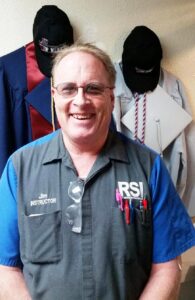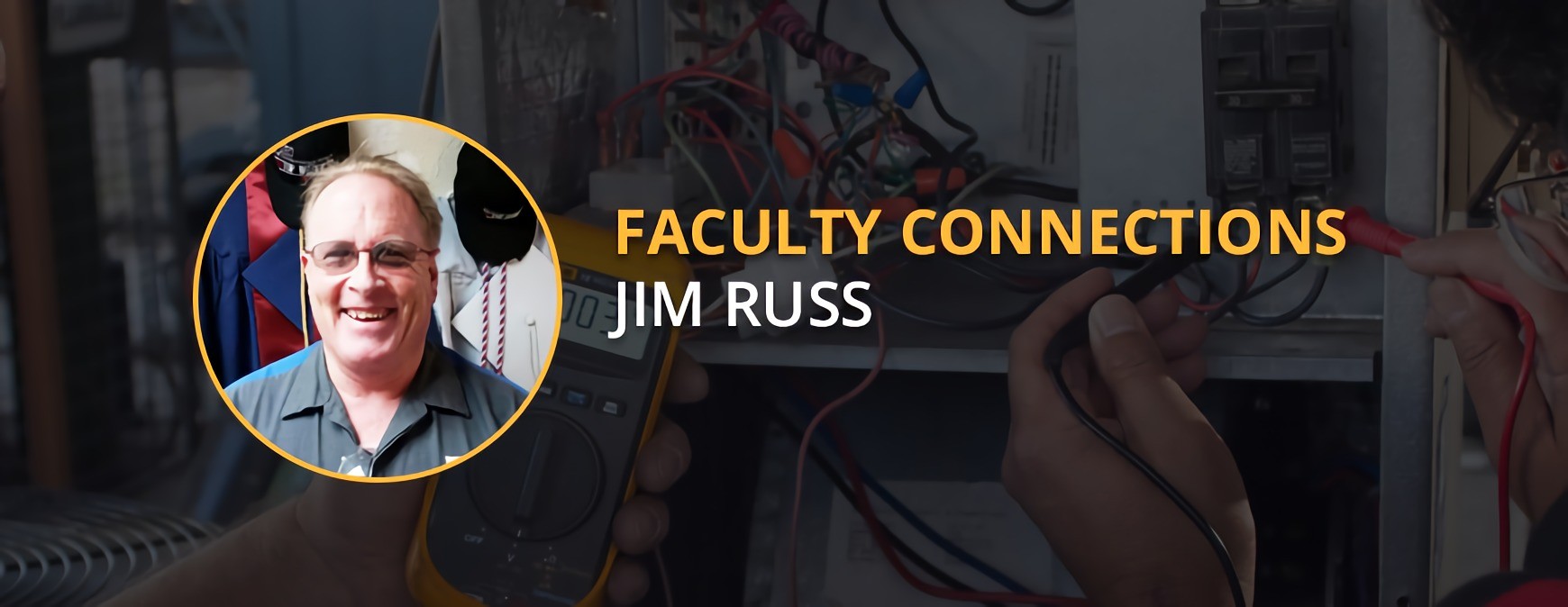RSI is a Great Training Option for Everyone
Learn more about how we can prepare you to advance your career.
Jim, 61, originally from upstate New York, is a lead instructor at The Refrigeration School (RSI). Jim joined RSI in August 2017.
Thanks for your time, Jim. Tell us a little about your early career.
I went into the U.S. Air Force out of high school. After two years, I got a scholarship to become an officer. I could go to any college in the United States to get a degree in electrical and computer engineering. That’s how I came to Arizona—to go to ASU, but I never completed my degree.
Thank you for your service. What happened?
During my junior year at ASU, two friends were killed in a car accident, my roommate was in a coma. Going through counseling, I realized that engineering wasn’t my passion. I left and took the schooling I had and used it to get into the air conditioning field.
Get Started on the Path to a New Career
Fill out our form to learn how we can help you change your life.
That must have been a difficult time. Did you go to a trade school like RSI later?
No, I learned my electrical troubleshooting skills in the Air Force working with electronics. When I started working, I soon realized that all the physics and thermodynamics I’d learned about at school was actually how air conditioners worked. Once that clicked for me, it was easy to start fixing stuff. So even though I didn’t go to a school like RSI, my training was still in-depth.
How long have you worked in air conditioning?
I have been strictly in the HVACR field for 33 years. I have a total of nine years teaching air conditioning within that 33. During 24 years in the field, I worked for a bunch of companies and did a lot of different things. I started in apartments doing everything, then residential, then light commercial air conditioning. I also went into commercial air conditioning/refrigeration. I did construction along the way. I’ve done everything up to 200-ton air conditioners, 150-ton freezers, some big equipment.
What did you want to be when you were younger?
That was the question that got me into air conditioning! The counselor at ASU asked, “What would you do if everybody got paid the same?” I told him I’d always wanted to do something that involved working with my hands, that was kind of creative. His response was, “Why aren’t you doing that?” That’s when I left and went to work for an apartment complex. I soon realized that, in the air conditioning trade, I could use my hands and my brain to create things and solve problems, and have a blast doing it.
Why did you decide to become an instructor?
It was by fluke, actually. I had a student riding with me. He asked me to come into school and meet the A/C program director. I walked in and the director said, “Oh, you’re Jim!” and offered me a part-time position on the spot, teaching at night. I wasn’t looking for a teaching job, it wasn’t even on my radar. But I thought about it and decided to give it a whirl. I fell in love with it. I taught part-time for one semester, then I quit working in the field and went to teaching full-time.

What do you enjoy most about teaching?
When people come in who don’t know too much about the subject, and then I see them get these “aha moments” when they start to get it. I like to see that excitement on their face.
Tell me something that most people don’t know about you?
When I was at ASU, six other students and I designed a portable burglar alarm as a class project. This was four or five years before Radio Shack came out with their version. I didn’t have money to get a lawyer and get paid for the patent. The other thing is, if I’d stayed with my electrical and computer engineering, I’d probably have been working for Bill Gates when he started Microsoft! You know how much those guys got in stock options? But I don’t regret it at all, not one bit! Being creative is what I really like to do.
If you weren’t a teacher what would you do?
I love what I’m doing. I like to give back, so if money was no object and I couldn’t do what I’m doing now, I’d like to teach homeowners and property managers how units work. To give them some insight so they are better educated to deal with some of the fly-by-night outfits out there. An educated customer can make an educated decision and not buy stuff they don’t need. I would also do some more charity work when it comes to A/C and heating. There are a lot of people out there who need help.
If you could have dinner with anyone, alive or dead, who would it be?
My father Edward Russ. He died in 2009. He was a research engineer for Carrier Air Conditioning. He was a very intelligent man.
Tell us a little about your family.
I’m married. We have two children and a two-and-a-half-year-old grandson.
What’s the best piece of advice you’d give to new students considering RSI?
Be here every single day. When you come to a trade school like RSI, you get the field experience of every instructor. We’ll give you insight into a lot of different things that you can’t find in the books or on YouTube, a way to do the job that is professional, and a way to do things the right way. I encourage students to be here every day, be the best they can be, and ask questions.
Out in the field, treat every customer like you would want your grandmother treated. Don’t look at your customers as dollar signs. Ask yourself, “How would I want my grandmother treated?” and act accordingly.
What was your favorite tool in the field?
My multi-meter. Most problems in the trade are related to electrical: a switch is open, a wire is broken, the motor is not working. Your meter allows you to check and follow voltage, to find out where it stops.
What was your favorite part of your time in the field?
Service calls were fun! I got to meet a lot of different people and each job is different. The last few years in the field, I worked for a commercial company. I got to do a lot of traveling throughout the United States. That was fun, too, going different places, different locations, not always in the hot sun.
If you got an unexpected day to yourself, what would you do with that time?
I like making things, so I would do some woodworking, some metalworking. I do a little artistic welding. Being creative is relaxing for me, so any chance I get to be creative, that’s what I would do.
If you were to tell someone “thank you” for making you the man you are today, who would it be?
My parents. They made me who I am today. They gave me my work ethic, the way I treat people. They encouraged me to follow my own path. My dad told me I should be an engineer, but I told him I didn’t want to do that at the time. He didn’t tell me I had to, they just encouraged me to do what I enjoyed doing. It didn’t matter to them what I did, as long as I was happy.
Additional Sources
This blog has been labeled as archived as it may no longer contain the most up-to-date data. For a list of all current blog posts, please visit our blog homepage at https://www.rsi.edu/blog/




